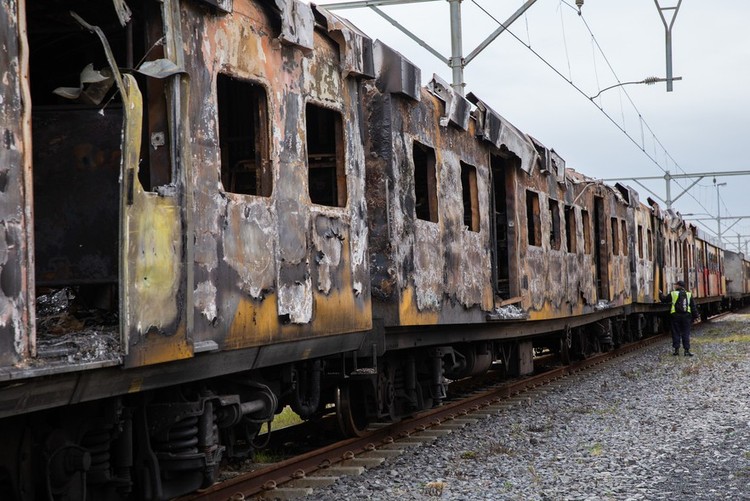Former PRASA board members should be declared delinquent, says SCOPA chair
Irregular and possibly corrupt security contracts led to the widespread destruction of South Africa’s rail network
A burnt out train at the Paarden Eiland depot in Cape Town. Corruption at PRASA has almost destroyed commuter rail in the city, and Parliament’s Standing Committee on Public Accounts is calling for the board members who oversaw the rail agency’s destruction to face consequences. Archive photo: Ashraf Hendricks
- Metrorail’s Central Line in Cape Town was suspended in December 2017 following ongoing vandalism and theft of infrastructure.
- In 2019, dodgy security contracts were terminated, but no new contracts were put in place.
- With the rail lines left unguarded, theft and vandalism accelerated, with households occupying the Central Line during the Covid lockdown.
- Efforts to restore the Central Line to full service are underway, but SCOPA says there must be consequences for those who oversaw the destruction of infrastructure.
The former PRASA board of directors whose decision to cancel security contracts, which contributed to large scale theft and vandalism of infrastructure, should be declared delinquent to prevent their future appointment on any other board.
This was the view expressed by Parliament’s Standing Committee on Public Accounts (SCOPA) chairperson Mkhuleko Hlengwa during a site visit to Philippi in Cape Town on 20 March. The site visit was to check the progress of the recovery of PRASA infrastructure and the relocation of households who had built shacks on the railway line.
Services on PRASA’s Metrorail Central Line between Cape Town station and the working class areas of Khayelitsha and Mitchells Plain were suspended in December 2017 following months of sustained vandalism, cable theft, and destruction of infrastructure. This was the result of continued irregular and possibly corrupt security contracts. Then in 2019, PRASA terminated security services without new contracts in place.
Further theft and vandalism of infrastructure took place, and during the Covid lockdown, households unable to afford backyard rentals occupied the non-functioning Central Line. Over time, thousands of households came to occupy sections of the line.
Hlengwa said the work done to recover railway infrastructure and relocate thousands of shack dwellers who had occupied the railway line would be undermined if there were no consequences for those who were responsible.
“The exercise will be incomplete if the board don’t pursue the then board members (and) hold them liable and accountable for the kinds of decisions that they took, considering the millions and billions of rands which now have been incurred,” said Hlengwa.
He said it was the committee’s expectation that parallel to the recovery of the Central Line, action would be taken against the former board members who “should be declared delinquent”.
In a SCOPA meeting three weeks prior to the site visit, Hlengwa told national transport department and PRASA representatives that “the ball is still in PRASA’s court” in terms of pursuing the former board of directors.
“I hope there is progress on that,” he said. “Absence of consequence management on the part of PRASA … is a dereliction of duty. You would, by turning a blind eye on that one, be condoning that action. You need to regularise that situation by going after those people. It is non-negotiable because we are in this mess because of that decision [to terminate security contracts].”
Joseph Mayson, legal advisor for rail activist organisation #UniteBehind, told GroundUp the organisation supports the call for the former board members to be declared delinquent.
“It is a crucial step to achieve accountability for state capture and maladministration at PRASA. SCOPA must ensure that the Minister of Transport, Minister Chikunga, applies to court to have the directors declared delinquent,” said Mayson.
He said the cancellation of security contracts “has had dire consequences for the poor and working class in Cape Town”.
“The Central Line is the most crucial line in Cape Town, if not the country. The fact that it has been partially or fully closed since 2018 has caused poor and working class people to spend more than 30% of their income on alternative means of transport. It also reinforces the spatial injustices of our city - a legacy of apartheid.”
PRASA spokesperson Andiswa Makanda has said it was the Minister of Transport’s responsibility to act against the former board, as it was the minister who made the board appointments.
The current chairperson of the PRASA board, Nosizwe Nokwe-Macamo, who attended the oversight visit on 20 March, told GroundUp that declaring the former board members delinquent was “an issue that is dealt with by the shareholders”, being the state.
Support independent journalism
Donate using Payfast

Don't miss out on the latest news
We respect your privacy, and promise we won't spam you.
Next: Mpumalanga pensioners furious that SASSA paypoint closed
Previous: Concourt says no to dodgy lottery lawyer
© 2024 GroundUp. This article is licensed under a Creative Commons Attribution-NoDerivatives 4.0 International License.
You may republish this article, so long as you credit the authors and GroundUp, and do not change the text. Please include a link back to the original article.
We put an invisible pixel in the article so that we can count traffic to republishers. All analytics tools are solely on our servers. We do not give our logs to any third party. Logs are deleted after two weeks. We do not use any IP address identifying information except to count regional traffic. We are solely interested in counting hits, not tracking users. If you republish, please do not delete the invisible pixel.

